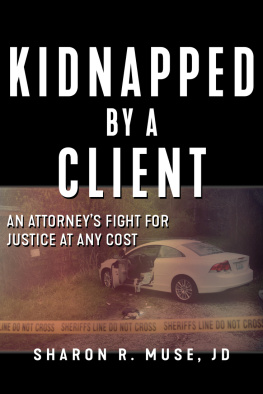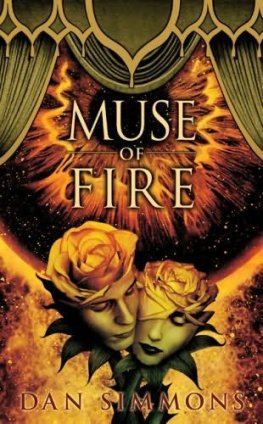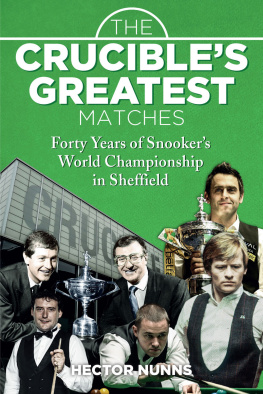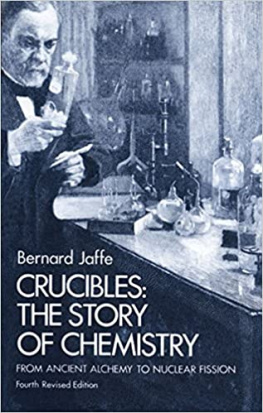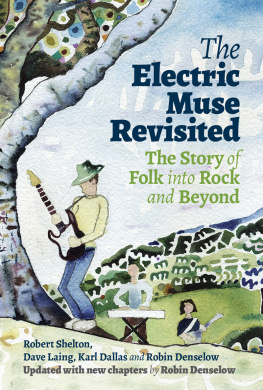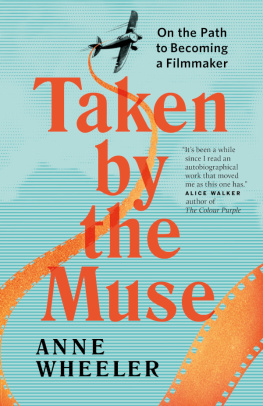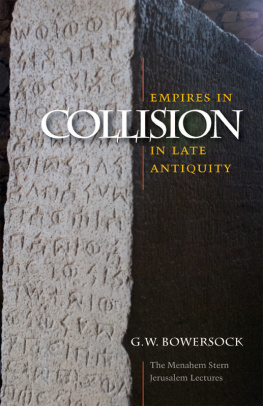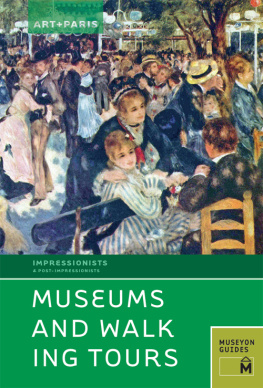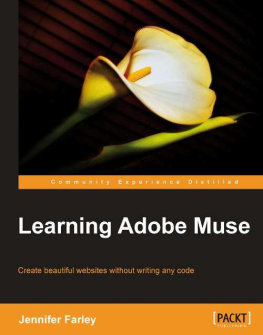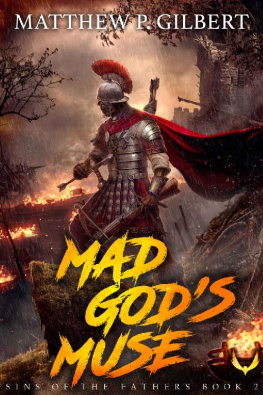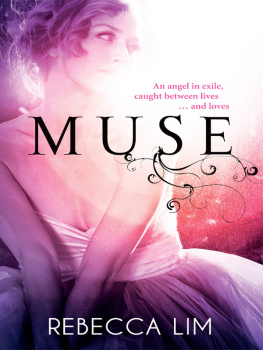Muse - Microdramas: Crucibles for Theater and Time
Here you can read online Muse - Microdramas: Crucibles for Theater and Time full text of the book (entire story) in english for free. Download pdf and epub, get meaning, cover and reviews about this ebook. City: Ann Arbor, year: 2017, publisher: University of Michigan Press, genre: Home and family. Description of the work, (preface) as well as reviews are available. Best literature library LitArk.com created for fans of good reading and offers a wide selection of genres:
Romance novel
Science fiction
Adventure
Detective
Science
History
Home and family
Prose
Art
Politics
Computer
Non-fiction
Religion
Business
Children
Humor
Choose a favorite category and find really read worthwhile books. Enjoy immersion in the world of imagination, feel the emotions of the characters or learn something new for yourself, make an fascinating discovery.

- Book:Microdramas: Crucibles for Theater and Time
- Author:
- Publisher:University of Michigan Press
- Genre:
- Year:2017
- City:Ann Arbor
- Rating:5 / 5
- Favourites:Add to favourites
- Your mark:
- 100
- 1
- 2
- 3
- 4
- 5
Microdramas: Crucibles for Theater and Time: summary, description and annotation
We offer to read an annotation, description, summary or preface (depends on what the author of the book "Microdramas: Crucibles for Theater and Time" wrote himself). If you haven't found the necessary information about the book — write in the comments, we will try to find it.
Muse: author's other books
Who wrote Microdramas: Crucibles for Theater and Time? Find out the surname, the name of the author of the book and a list of all author's works by series.
Microdramas: Crucibles for Theater and Time — read online for free the complete book (whole text) full work
Below is the text of the book, divided by pages. System saving the place of the last page read, allows you to conveniently read the book "Microdramas: Crucibles for Theater and Time" online for free, without having to search again every time where you left off. Put a bookmark, and you can go to the page where you finished reading at any time.
Font size:
Interval:
Bookmark:
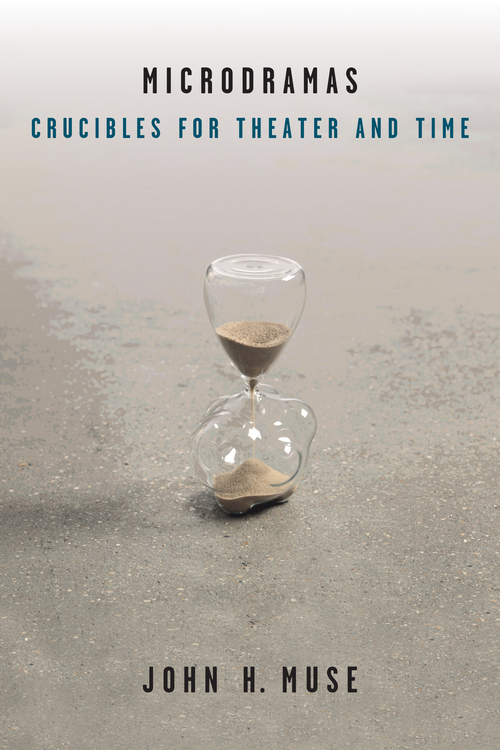
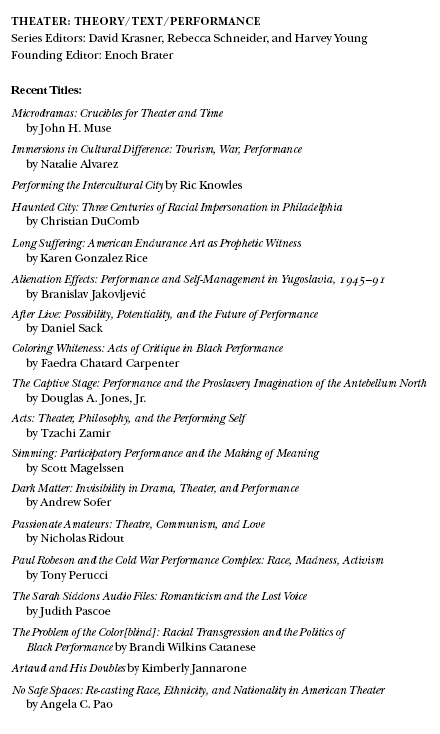
John H. Muse
University of Michigan Press
Ann Arbor
Copyright 2017 by John H. Muse
All rights reserved
This book may not be reproduced, in whole or in part, including illustrations, in any form (beyond that copying permitted by Sections 107 and 108 of the U.S. Copyright Law and except by reviewers for the public press), without written permission from the publisher.
Published in the United States of America by the
University of Michigan Press
Manufactured in the United States of America
A CIP catalog record for this book is available from the British Library.
Library of Congress Cataloging-in-Publication Data
Names: Muse, John H., author.
Title: Microdramas : crucibles for theater and time / John H. Muse.
Description: Ann Arbor : University of Michigan Press, 2017. | Series: Theater: theory/text/performance | Includes bibliographical references and index.
Identifiers: LCCN 2017023312| ISBN 9780472073634 (hardback) | ISBN 9780472053636 (paperback) | ISBN 9780472123148 (e-book) Subjects: LCSH: One-act playsHistory and criticism. | One-act playsTechnique. | TheaterProduction and direction. | BISAC: PERFORMING ARTS / Theater / General. | LITERARY CRITICISM / Drama. Classification: LCC PN1661 .M87 2017 | DDC 808.2/41dc23 LC record available at https://lccn.loc.gov/2017023312
For Sadie & Jack
I am so grateful to those who have given their time and attention to this project. I owe a debt to Elinor Fuchs for setting the fuseunwittinglywith her offhand remark that modernist theater teems with fascinating short plays. Joseph Roach and Marc Robinson were there at the very beginning and have been brilliant and patient guides: enthusiastic in their support, unfailingly generous with their time, and incisive in their comments.
Early work on the project was supported by fellowships in the names of Andrew W. Mellon and Mrs. Giles F. Whiting; I am grateful to both benefactors. I thank the Beinecke Library for a research fellowship that introduced me to a trove of useful material on Symbolism and Italian Futurism. A number of colleagues at Yale offered advice about the project in its early stages, including James Leverett, Caleb Smith, Elliott Visconsi, Paul Fry, Ruth Yeazell, and especially Sam See, whom we all miss. Wes Davis and Elizabeth Alexander each volunteered to read chapters, and I am grateful for their time and insight. Pericles Lewis, who has been a mentor since my undergraduate years, taught me much of what I know about literary modernism. I owe a profound debt to my amazing compatriots working on theater and performance studies at Yale, including Nick Salvato, Julia Fawcett, Christopher Grobe, Ariel Watson, Rachel Rusch, Jason Fitzgerald, Joseph Cermatori, Nathalie Wolfram, Christine Mok, Uri McMillan, Liz Son, Jacob Gallagher-Ross, and Miriam Felton-Dansky. Amerigo Fabbri taught me much about Italian Futurism and helped with a few crucial translations. Small sections were presented as talks or papers at Yales Twentieth Century Colloquium, at the American Society for Theatre Research Conferences in Boston, San Juan, Seattle, Nashville, and Baltimore; at the Modernist Studies Association conference in Montreal; the Radical Intersections Conference at Northwestern University Performance Studies; the Theatrephobia symposium and the Theater and Performance Studies Graduate Workshop at University of Chicago; and the Structures of Digital Feeling conference at SUNY Buffalo. I thank all of my interlocutors at those meetings for refining my thinking. I am grateful for the invaluable feedback I received on the Beckett chapter from the faculty working group of the first Mellon School for Theater and Performance Studies at Harvard: Martin Puchner, Corey Frost, Mirabelle Ordinaire, Heidi Bean, T. Nikki Cesare Shotzko, Julia A. Cassidy, Sasha Colby, Bertie Ferdman, Jeffrey Leichman, Holly Maples, and Magda Romanska. Colleagues in the field have sustained me throughout the process and offered helpful advice both online and at conferences. Thanks in particular to Kate Bredeson, Aaron Thomas, Brian Herrera, Darren Gobert, Ellen Mackay, Daniel Sack, and Robin Bernstein.
This would not be the book it is without the University of Chicago and its intellectual community. I thank especially my wonderful senior colleagues and mentors in the English department, who have been so generous with their time and expertise, especially Debbie Nelson, Bill Brown, Loren Kruger, Lauren Berlant, Lisa Ruddick (whose encouragement always buoys me), Bradin Cormack (whose intuitive sense of the books project still impresses me), Maud Ellmann, Josh Scodel, Ken Warren, Elaine Hadley, Patrick Jagoda, Jennifer Scappettone, and Chicu Reddy. I have learned so much from David Bevington both about theater and about how to be in the world; you will never find a more gracious and helpful scholar. I could never have expected how much my time and work at Chicago would be shaped by the camaraderie of junior faculty from University of Chicago and across the city. Thanks to everyone who read my work through the Chicago Junior Faculty Working Group, especially my colleagues Richard So, Benjamin Morgan, Hilary Chute, Ral Coronado, Adrienne Brown, Sonali Thakkar, Zach Samalin, Timothy Harrison, Julie Orlemanski, Rachel Galvin, Edgar Garcia, Heather Keenleyside, Timothy Campbell, and Nicole Wright, but also, of course, Neil Verma, Andrew Leong, Harris Feinsod, Nassar Mufti, Megan Heffernan, Jon Cutler, Rebecca Johnson, and Jim Hodge, among others. All of these colleagues give me hope for the future of the humanities.
A yearlong fellowship from the University of Chicagos Franke Institute for the Humanities came at just the right time, affording space, time, and companionship as I revised the book and reconceived its conclusions. For this, I offer thanks not only to Barbara and Richard Franke, but to Director Jim Chandler and the Frankes inimitable staff, Margot Browning, Mai Vukcevich, Bertie Kibreah, and especially Harriet Moody, who always had a key when I forgot mine and always asked after my daughter. My fellow fellows from across the Division were exceptionally thoughtful and generous readers. Thank you Emily Osborn, Steven Rings, Naama Rokem, Malte Willer, Peter Ericsson, Joela Jacobs, Ilanit Shacham, Benjamin Morgan, Benjamin Laurence, and Justin Sternberg.
The burgeoning Theater and Performance Studies (TAPS) community at University of Chicago has been a key intellectual home for me over the past few years. Thanks especially to my fellow faculty members from the Committee on TAPS, David Levin, Christopher Wild, Larry Norman, Heidi Coleman, Seth Brodsky, Agnes Lugo-Ortiz, Sarah Nooter, Reggie Jackson, Rocco Rubini, and Judith Zeitlin. Members of the TAPS Graduate Workshop read the Beckett chapter and a draft toward the introduction. Thanks in particular to student coordinators Amy Stebbins, Matthew Stone, Artemis Willis, Anne Rebull, and Brian Berry.
I have learned so much from my exceptional students at Chicago, especially Nahuel Telleria, David Lurie, Evan Garrett, Hannah Brooks-Motl, Sharvari Sastry, and Marissa Fenley, as well as everyone else from my seminars on Staging Modernism, Impossible Theaters, Beckett, Short Attention Span Fictions, and Virtual Theaters. Three PhD candidates in particular, Amanda Shubert, Rachel Kyne, and Nell Pach, have been invaluable research assistants for the book. I am forever grateful for their diligent and inspired work. Chiara Montanari provided crucial assistance with Italian sources and translated a number of previously unpublished Futurist plays.
Next pageFont size:
Interval:
Bookmark:
Similar books «Microdramas: Crucibles for Theater and Time»
Look at similar books to Microdramas: Crucibles for Theater and Time. We have selected literature similar in name and meaning in the hope of providing readers with more options to find new, interesting, not yet read works.
Discussion, reviews of the book Microdramas: Crucibles for Theater and Time and just readers' own opinions. Leave your comments, write what you think about the work, its meaning or the main characters. Specify what exactly you liked and what you didn't like, and why you think so.

